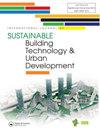气候变化和海平面上升对克洛斯河河口沿海渔业社区的影响:浮动可持续住区的概念作为解决方案
Q4 Engineering
International Journal of Sustainable Building Technology and Urban Development
Pub Date : 2015-01-02
DOI:10.1080/2093761X.2014.979267
引用次数: 4
摘要
气候变化的影响在世界范围内都是显而易见的,从两极冰盖融化到热带地区的森林砍伐,再到世界沿海边缘的海平面上升。这主要是由于大气温室活动造成的。化石燃料的人为排放已经改变了大气中二氧化碳(一种重要的温室气体)的成分平衡。气候变化影响的传播是广泛的,并跨越国界影响到土地和人民。受到威胁的是居住在脆弱土地上的人们,如沿海屏障地、高地之间的沟槽、沼泽地等。几代人以来,生活在尼日利亚克罗斯河河口沿岸以及卡拉巴尔河、伊莫河和大克瓦河支流的人们一直从事着他们的捕鱼职业,从未遇到过严重的挫折。由于主要由气候变化引起的无法预测的洪水所带来的不确定性,这种情况最近发生了变化。这篇论文研究了一个可能的效果的场景……本文章由计算机程序翻译,如有差异,请以英文原文为准。
Climate change and the effect of sea-level rise on the coastal fishing communities of Cross River Estuary: the concept of floating sustainable settlements as a solution
The effects of climate change are evident worldwide, from melting ice caps at the Poles to deforestation at the tropics, and to rising sea level along the world's coastal margins. The cause is due largely to atmospheric greenhouse activities. The anthropogenic emissions from fossil fuel have altered the compositional balance of carbon dioxide (an important greenhouse gas) in the atmosphere. The spread of climate change impact is wide and affect lands and peoples across national boundaries. Among the threatened are people who inhabit the vulnerable lands such as coastal barrier lands, troughs between highlands, marshlands, etc. For generations, the people who live by the coast of Cross River Estuary and the tributaries of Calabar, Imo and Great Kwa Rivers in Nigeria have practised their fishing occupation without serious hitches. This situation has changed of late due to uncertainties associated with unpredicted flooding attributed mainly to climate change. This paper examines a scenario of the likely effe...
求助全文
通过发布文献求助,成功后即可免费获取论文全文。
去求助
来源期刊

International Journal of Sustainable Building Technology and Urban Development
Engineering-Building and Construction
CiteScore
1.20
自引率
0.00%
发文量
0
期刊介绍:
The International Journal of Sustainable Building Technology and Urban Development is the official publication of the Sustainable Building Research Center and serves as a resource to professionals and academics within the architecture and sustainability community. The International Journal of Sustainable Building Technology and Urban Development aims to support its academic community by disseminating studies on sustainable building technology, focusing on issues related to sustainable approaches in the construction industry to reduce waste and mass consumption, integration of advanced architectural technologies and environmentalism, sustainable building maintenance, life cycle cost (LCC), social issues, education and public policies relating to urban development and architecture .
 求助内容:
求助内容: 应助结果提醒方式:
应助结果提醒方式:


